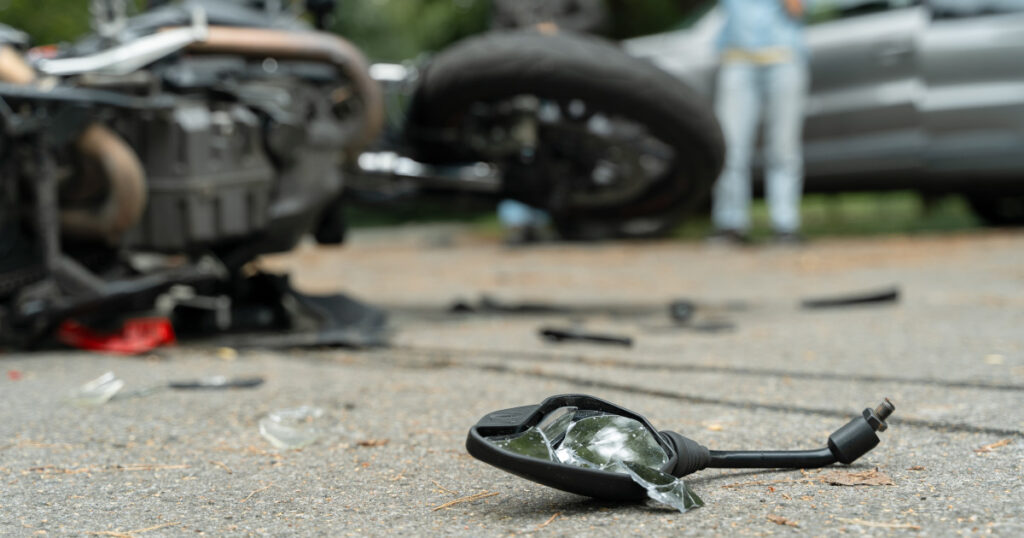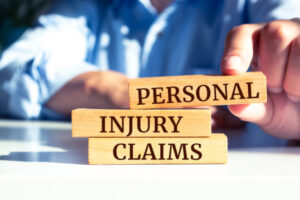Featured Article

When “Carlos” (name changed) was riding home from work one evening, a car ran a stop sign and T-boned his motorcycle. He flew several feet and landed on the asphalt, suffering a broken leg and a concussion. The driver’s insurance company immediately called, asking questions about how the accident happened and suggesting Carlos might share the blame. He felt overwhelmed and unsure where to start.
Unfortunately, Carlos’ story is all too common. Motorcycle accidents can be devastating, and the process of proving negligence in a motorcycle accident is often confusing and intimidating — especially when dealing with insurance companies who are trained to protect their own interests.
At the Law Office of David M. Kennedy, we’ve helped countless riders navigate this complex process. Here’s what you need to know to protect yourself and your claim.
1. Understanding Negligence in Motorcycle Accidents
Negligence is the legal concept that someone failed to exercise reasonable care, which then caused your injuries. In motorcycle crashes, negligence often takes many of the same familiar forms, such as:
- Running a red light or stop sign
- Distracted driving (texting, phone use, or eating)
- Speeding or reckless behavior
- Failing to yield
Simply put, the other driver’s carelessness is what caused your accident — and your goal is to show that clearly. That’s why proving negligence in a motorcycle accident is essential to securing fair compensation.
2. Why Motorcycle Accidents Are Unique
Motorcycles offer no protective frame or airbags, so injuries are often more severe and obvious. But insurers may assume that any accident involving a bike is the rider’s fault. They may downplay the severity of your injuries or suggest you could have prevented the crash or were a risk-taker by riding a bike.
This bias makes proving negligence in a motorcycle accident more complicated than with a car-to-car collision. It’s not enough to show that the other driver made a mistake; you must document exactly how their actions caused your injuries.
3. Gathering Evidence
Strong evidence is the backbone of every motorcycle accident claim. Some key steps include:
- Photos of the accident scene: Capture skid marks, debris, traffic signals, and road conditions.
- Witness statements: Collect contact information and accounts from anyone who saw the crash.
- Police reports: Official documentation can provide critical details about fault.
- Medical records: Document all injuries, treatments, and rehabilitation to show the accident’s impact.
- Damage reports: Include your bike, helmet, and protective gear assessments.
At the Law Office of David M. Kennedy, we help clients collect and organize this evidence so that proving negligence in a motorcycle accident is clear and undeniable. You will play some role in record gathering, but you were the victim, and we generally take charge and let you concentrate on recovery.
4. The Role of Expert Witnesses
Insurance adjusters may try to minimize liability by arguing that your injuries don’t match the crash or that other factors contributed. Expert witnesses can counter these claims by:
- Accident reconstruction to show how the crash occurred
- Medical professionals explaining how injuries are consistent with the impact
- Economic experts quantifying lost wages and future care needs
These experts help ensure that your claim accurately reflects the full scope of your damages and makes proving negligence in a motorcycle accident more straightforward in negotiations or court.
5. Avoid Common Pitfalls
Many riders unintentionally weaken their claims. Common mistakes include:
- Speaking to insurance adjusters without legal representation, even your own
- Delaying medical treatment or follow-ups
- Posting details about the accident on social media
- Failing to document lost income or daily limitations
All of these can be used to question your credibility or minimize your damages. Knowing how to avoid these pitfalls is part of our role at the Law Office of David M. Kennedy.
6. Legal Strategy and Advocacy
Proving negligence is not just about evidence; it’s about presenting it effectively. Insurance companies often rely on complex legal and financial tactics to reduce payout. A skilled motorcycle injury attorney:
- Organizes your documentation in a clear, persuasive way
- Communicates with adjusters professionally and strategically
- Advises on settlement offers versus litigation
- Represents your interests in court if necessary
By working with us, riders like Carlos can focus on recovery while we handle the legal complexities. Proving negligence in a motorcycle accident becomes a process led by professionals who understand both the law and the realities of motorcycling.
7. Why You Need an Experienced Motorcycle Attorney
Motorcycle crashes involve unique challenges — from bias against riders to severe injuries and complicated fault issues. Trying to handle your claim alone can lead to delays, undervalued settlements, or outright denial.
At the Law Office of David M. Kennedy, we bring decades of experience representing injured motorcyclists. We know the tactics insurers use, how to gather persuasive evidence, and how to advocate for full compensation on your behalf. You don’t have to navigate the aftermath alone.
Standing Up for Injured Motorcyclists
If you’ve been hurt in a motorcycle accident, remember: your injuries are real, and your claim deserves proper attention. The process of proving negligence in a motorcycle accident may seem overwhelming, but you don’t have to face it alone.
At the Law Office of David M. Kennedy, we provide guidance, expertise, and relentless advocacy to help riders secure the compensation they need to recover. If you’ve been injured in a motorcycle accident, don’t try to handle it alone. Call us at (903) 819-0720 or Email today for your free consultation.




